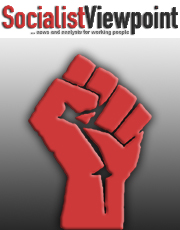Witness: Abu-Jamal Didn’t Do It
William Singletary has lived with the Mumia Abu-Jamal case from the beginning. “I just want the truth to be heard,” he said yesterday. “For 25 years, it’s something that’s rested on my mind heavily.”
Singletary was there, at 13th and Locust, when Police Officer Daniel Faulkner was killed in the early morning hours of Dec. 9, 1981. That is perhaps the only fact on which he and the Philadelphia police agree.
“Mumia Abu-Jamal didn’t shoot Daniel Faulkner,” Singletary said. “The passenger in the right-hand side of the Volkswagen [that Faulkner had stopped] got out of the car and shot him,” Singletary said. Singletary was a Philadelphia bar owner and gas-station operator at the time. He now lives in North Carolina.
Singletary said Abu-Jamal came running up minutes after Faulkner was shot. He said the passenger ran away. “When Mumia came on the scene, we [Singletary and another man] were on the police radio trying to radio for help,” Singletary said. He told the Daily News that he’s willing to take a lie-detector test to prove he is telling the truth. “But I’m not coming to Philadelphia unless y’all got Wells Fargo and Lords of London” for protection, he said.
Although Singletary signed a police statement saying he saw Abu-Jamal shoot Faulkner, he now claims police “coerced me” to sign it. He alleged that in the months leading up to the trial, men he believed to be police officers visited his gas stations to tell him to get out of town.” He said he did. He went to North Carolina during the trial and didn’t return until it was over. He never testified at Abu-Jamal’s first trial.
But Singletary’s story has been criticized by police. “He said the same thing that three other witnesses said that night,” Robert Eddis, president of Lodge 5 of the Fraternal Order of Police, said yesterday. “Now, after all these years,” Eddis said, it’s strange that Singletary is saying otherwise. As for Singletary’s claims that he was intimidated, Eddis said he could have asked for the witness-protection program or filed a complaint and his charges would have been investigated. “It just seems that it doesn’t add up,” Eddis said.
In 1981, Singletary was a part-owner of the Bombay Lounge, a bar and hotel at 1504 Catharine St. His family also operated a couple of gas stations, one in North Philadelphia, at Broad and Thompson, the other in West Philadelphia. And they ran Aldale Towing. Singletary had driven from his bar to the Whispers night club, at 13th and Locust, some time after 3 a.m.
“Business at my place was slow,” he said. “Everybody was leaving my bar and going to Whispers. I wanted to know what was going on there.” When he got to Whispers, Singletary said the person at the door wouldn’t let him in.
Singletary started walking south on 13th street toward his car when Cynthia White, the prostitute who would later testify against Abu-Jamal, approached and said, “Hey, how you doing? It’s cold out here.” As he approached his car, “a brand-new Cadillac Eldorado, 1982 model,” White said, “Wow, that’s a great car!” “Then she said, ‘You ain’t that bad-looking either. But I don’t date black guys.’ “
Singletary said he returned: “And I don’t date prostitutes.”
It was almost 4 in the morning.
White walked off. And that’s when Singletary said he heard the noisy sound of a Volkswagen being driven the wrong way down 13th Street. “There was a cop right behind it, following bumper to bumper. Sirens blaring,” he said. “So I said to myself, ‘Maybe I can get me a tow out of this.’”
He said he heard the officer yelling at the driver, “a little short guy” who turned out to be Billy Cook that “‘This car has no inspections, no tags, no insurance.’” He said the officer put Cook up against the wall and started to handcuff him when Cook’s passenger got out of the car and shot Faulkner twice.
Singletary said Abu-Jamal came running up minutes later and said: “Hey, that’s my brother’s car. Where’s my brother?” Then he approached Faulkner.
When Singletary went to the Police Administration Building, at 8th and Race streets, he said police were angry because he had first refused to sign a statement that he had seen Abu-Jamal shoot Faulkner. He said Cynthia White, who had walked down the street, didn’t actually see the shooting. “I walked in there as a witness,” Singletary said. “I thought I was doing the right thing. I am a Vietnam veteran. I have a Purple Heart. I pay my taxes and I served on jury duty. “But they were going to get a prostitute who was locked up 38 times and use her word against mine,” Singletary told the Daily News.
When he finally signed a statement that Abu-Jamal had shot Faulkner, it was under duress, he said. “That’s what they made me say,” he said. “I stayed in there from 4:30 to 9:30 a.m. and when I left, I felt like I had been raped.”
Later that afternoon, Singletary said plain-clothes police officers came into his Broad and Thompson gas station with guns drawn. “They made everybody lay down on the floor,” he said, saying they had a report of a burglary. “They said they had a call that there was a burglary taking place.” Singletary testified in 1995 that police stopped by often, checking motorists’ inspection stickers, licenses and insurance cards so often that business dropped off.
Eventually, he couldn’t pay the rent and had to close the station. Business soured so much that he left Philadelphia and moved to North Carolina 10 years ago.
But all this time, he said: “My story hasn’t changed in 25 years, and it won’t change in the next 25 years, if I’m alive.”
—Philadelphia Daily News, December 8, 2006


